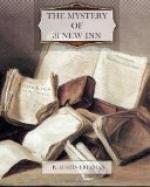“The argument,” said Thorndyke, “will be a rather long one, as the data are so numerous, and there are some points in verification on which I shall have to dwell in some detail. We will have some coffee to clear our brains, and then I will bespeak your patience for what may seem like a rather prolix demonstration.”
Chapter XVI
An Exposition and a Tragedy
“You may have wondered,” Thorndyke commenced, when he had poured out the coffee and handed round the cups, “what induced me to undertake the minute investigation of so apparently simple and straightforward a case. Perhaps I had better explain that first and let you see what was the real starting-point of the inquiry.
“When you, Mr. Marchmont and Mr. Stephen, introduced the case to me, I made a very brief precis of the facts as you presented them, and of these there were one or two which immediately attracted my attention. In the first place, there was the will. It was a very strange will. It was perfectly unnecessary. It contained no new matter; it expressed no changed intentions; it met no new circumstances, as known to the testator. In short it was not really a new will at all, but merely a repetition of the first one, drafted in different and less suitable language. It differed only in introducing a certain ambiguity from which the original was free. It created the possibility that, in certain circumstances, not known to or anticipated by the testator, John Blackmore might become the principal beneficiary, contrary to the obvious wishes of the testator.
“The next point that impressed me was the manner of Mrs. Wilson’s death. She died of cancer. Now people do not die suddenly and unexpectedly of cancer. This terrible disease stands almost alone in that it marks out its victim months in advance. A person who has an incurable cancer is a person whose death may be predicted with certainty and its date fixed within comparatively narrow limits.
“And now observe the remarkable series of coincidences that are brought into light when we consider this peculiarity of the disease. Mrs. Wilson died on the twelfth of March of this present year. Mr. Jeffrey’s second will was signed on the twelfth of November of last year; at a time, that is to say, when the existence of cancer must have been known to Mrs. Wilson’s doctor, and might have been known to any of her relatives who chose to inquire after her.
“Then you will observe that the remarkable change in Mr. Jeffrey’s habits coincides in the most singular way with the same events. The cancer must have been detectable as early as September of last year; about the time, in fact, at which Mrs. Wilson made her will. Mr. Jeffrey went to the inn at the beginning of October. From that time his habits were totally changed, and I can demonstrate to you that a change—not a gradual, but an abrupt change—took place in the character of his signature.




